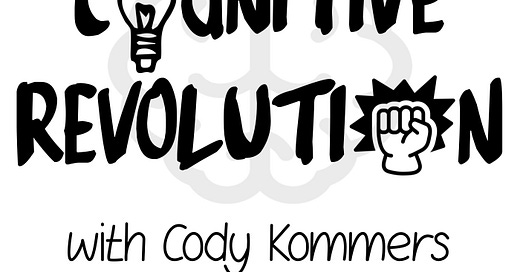This is Cognitive Revolution, my show about the personal side of the intellectual journey. Each week, I interview an eminent scientist, writer, or academic about the experiences that shaped their ideas. The show is available wherever you listen to podcasts.
Mark and I recorded this interview about a month ago, before the outbreak of protests across the world in support of the Black Lives Matter movement. A lot has changed since then. Conversations are different, as are the topics under discussion. This interview does not reflect those changes, at least not directly. Even so, a number of the topics in our conversation and in Mark's research more generally are relevant. In my hometown of Seattle, I watched these protests turn violent as the city toppled into rioting and chaos. And while individual acts of vandalism and looting are deplorable, there is no doubt that riots have played a crucial role in societal change over the course of history. When a riot spurs on regime change, we call it a "revolution." As you'll hear in our conversation, the societal, economic, and psychological causes of revolutions has been an underlying motivation in many of Mark's great ideas. In particular are his threshold models of collective behavior, which compare the spread of rioting to -- of all things -- an epidemic. Still, these abstract concepts can seem very distant from the heart of the matter while it's unfolding around us.
What I hope Mark's perspective and his research can help us keep in mind is that riots are not isolated events perpetrated solely by malicious individuals. They are reflections of the societal and economic systems in which they are embedded. It's easy enough to identify that connection between the actions of seemingly violent individuals and broken systems when it's occurring in someone else's country. Such dramatic actions may even appear a necessary impetus for change. But it can be harder to see the connection when it's happening in our own country and our own city. And while this does not mean we should support or condone violence, it should be taken as a signal of a massive issue with the system. Healthy societies and economies don't produce riots, no matter what the ideological motivation of their citizens might be. Throughout history these events have often proved to be tipping points into a different way of doing things. That different way can either be much better or much worse. Let's make sure that we are doing everything we can to make sure ours is a case of the first one.
---
So much of what is interesting in the world consists in the interplay between the specific and the general. Sciences tends to focus on the general ("what are the laws that govern the universe?") while humanities tend to focus on the specific ("what did this particular individual do at this particular time?"). There is also a similar interplay between studying behavior at the level of the individual ("what is this person's psychological state?") and studying behavior at the level of the group ("how do all these people fit together into a coherent whole?"). I know of no person who has dedicated his career more fully to the study of social behavior in a way that bridges these perspectives than my guest for this episode, Mark Granovetter. Mark is a professor of sociology at Stanford, and one of the most influential sociologists of all time. His work formed the backbone for Malcolm Gladwell's Tipping Point, and several of his papers are among the most cited in his discipline. We cover a lot of ground in this episode, mainly drawing from Mark's early career experiences and where his most famous ideas came from. But we also get into his relationship to Gladwell, as well as the interplay between psychology and sociology. When talking about where his initial interests in sociology came from, he said something that I really loved because I think it captures the core of so much of his work: "Of course it was very interesting: 'Why was there a French revolution?' and 'Why was there a Russian revolution?'... But I realized that the thing I really wanted to understand was 'Why are there revolutions?'"
Like this episode? Here’s another one to check out:
I’d love to know what you thought of this episode! Just reply to this email or send a note directly to my inbox. Feel free to tweet the show @CogRevPod or me @CodyKommers. You can also leave a rating for the show on iTunes (or another platform). This is super helpful, as high ratings are one of the biggest factors platforms look at in their recommender system algorithms. The better the ratings, the more they present the show to new potential listeners.
Also: If you’d like to unsubscribe from these weekly podcast emails, you can do so while still remaining on the email list that features my weekly writing. Thanks for following my work!















Share this post